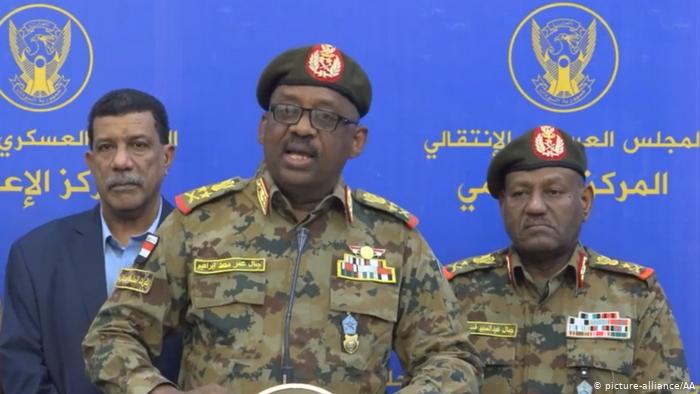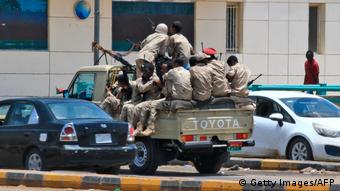
A purported coup attempt in Sudan on Thursday coincided with further talks between the country’s military council and pro-democracy movement on a power-sharing deal in the wake of April’s military ouster of long-time ruler Omar al-Bashir.
In a statement, General Omar (pictured center) said: “Officers and soldiers from the army and National Intelligence and Security Service, some of them retired, were trying to carry out a coup.” He said the bid was put down by “regular soldiers.”
“This is an attempt to block the agreement that has been reached by the Transitional Military Council and the Alliance for Freedom and Change that aims to open the road for Sudanese people to achieve their demands,” Omar said.
Bid made as talks continued
The AFP news agency said Omar’s announcement late Thursday came as legal advisers of the ruling council and protest leaders were discussing details of the last week’s power-sharing deal brokered by the African Union and Ethiopian envoys.
On Wednesday, Sudanese activists said internet services had been restored in the wake of a shutdown imposed after security forces razed a protest camp in Khartoum on June 3 during a three-week crackdown that claimed scores of lives.
Further huge protests against the military ensued, prompting mediators to broker a return to direct power-sharing talks.
The internet restoration, sought by an activist’s lawsuit in a Khartoum court, enabled Sudanese to post video footage of alleged abuses by security forces.
Three-year ‘sovereign council’
The deal agreed by the military and civilian activists foresees an 11-member “sovereign council” serving for three years. It would first be directed by the military and then by civilians and would eventually lead the country to elections.
In addition to the council, the deal also calls for the formation of a technocratic government and an independent probe into recent violence.
During the crackdown, protesters blamed Sudan’s paramilitary Rapid Support Forces (RSF) led by General Mohamed Hamdan Dagalo.
Sudan, a country of 40 million and a gateway between Africa and the Middle East, has long attracted foreign powers, including wealthy Gulf states, vying for influence.
Professor David Shinn, a former US diplomat who served in Sudan and then Ethiopia until 1999, told Al-Jazeera television early Friday, that it was “imperative” that powers, including the EU, China and Russia, ensured that the deal was implemented.
ipj/sms (AFP; AP, Reuters)





